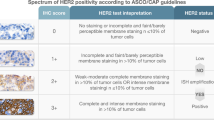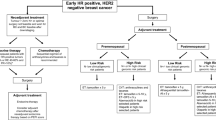Abstract
The assessment of the estrogen receptor (ER) α and the progesterone receptor (PgR) in breast cancer tissues is important for discriminating between hormone-dependent and hormone-independent tumors. ERβ, a more recently discovered ER, may influence estrogen action through the ERα pathway. To evaluate the clinical significance of these receptors in the response to endocrine therapy, we investigated their expression in primary breast cancer tissues. ERα and PgR were evaluated using immunohistochemistry (IHC) and enzyme immunoassay (EIA) and ERβ expression was determined using IHC and reverse transcription-polymerase chain reaction. When the cut-off level of EIA was set at 13 fmol/mg protein for ERα and that for IHC was set as an IHC score between 2 and 3, a significant correlation between ERα EIA and IHC was seen (concordance rate 88.4%). This indicates that this cut-off level of ERα IHC can be adopted to quantify breast cancer prognoses. Furthermore, the tumors with positive expression of ERα IHC or PgR IHC using this criterion were significantly related to the response to endocrine therapy. Additionally, tumors with positive expression of ERβ wild-type tended to have a better response to endocrine therapy than negative ones, and tamoxifen responders tended to exhibit a lower ratio of ERβcx (one of the ERβ variants) to ERβ wild-type than nonresponders. The results concerning ERβ are not yet fully understood; further investigations and evaluations should analyze the role of ERβ wild-type and variant type in breast cancer treatment.



Similar content being viewed by others
References
Bast RC, Ravdin P, Hayes DF, Bates S, Fritsche H, Jessup JM, Kemeny N, Locker GY, Mennel RG, Somerfield MR (2001) 2000 update of recommendations for the use of tumor markers in breast and colorectal cancer: clinical practice guidelines of the American Society of Clinical Oncology. J Clin Oncol 19:1865
Goldhirsch A, Glick JH, Gelber RD, Coates AS, Senn HJ (2001) Meeting highlights: International Consensus Panel on the Treatment of Primary Breast Cancer. Seventh International Conference on Adjuvant Therapy of Primary Breast Cancer. J Clin Oncol 19:3817
Harvey JM, Clark GM, Osborne CK, Allred DC (1999) Estrogen receptor status by immunohistochemistry is superior to the ligand-binding assay for predicting response to adjuvant endocrine therapy in breast cancer. J Clin Oncol 17:1474
Howell A, Dowsett M (1997) Recent advances in endocrine therapy of breast cancer. BMJ 315:863
Hu YF, Lau KM, Ho SM, Russo J (1998) Increased expression of estrogen receptor beta in chemically transformed human breast epithelial cells. Int J Oncol 12:1225
Iwase H, Itoh Y, Kuzushima T, Yamashita H, Iwata H, Toyama T, Hara Y, Kobayashi S (1997) Simultaneous quantitative analyses of c-erbB-2 protein, epidermal growth factor receptor, cathepsin D, and hormone receptors in breast cancer. Cancer Detect Prev 21:29
Jarvinen TA, Pelto-Huikko M, Holli K, Isola J (2000) Estrogen receptor beta is coexpressed with ERalpha and PR and associated with nodal status, grade, and proliferation rate in breast cancer. Am J Pathol 156:29
Jensen EV, Cheng G, Palmieri C, Saji S, Makela S, Van Noorden S, Wahlstrom T, Warner M, Coombes RC, Gustafsson JA (2001) Estrogen receptors and proliferation markers in primary and recurrent breast cancer. Proc Natl Acad Sci U S A 98:15197
Kobayashi S, Ito Y, Ando Y, Omoto Y, Toyama T, Iwase H (2000) Comparison of five different antibodies in the immunohistochemical assay of estrogen receptor alpha in human breast cancer. Breast Cancer 7:136
Leygue E, Dotzlaw H, Watson PH, Murphy LC (1998) Altered estrogen receptor alpha and beta messenger RNA expression during human breast tumorigenesis. Cancer Res 58:3197
Mann S, Laucirica R, Carlson N, Younes PS, Ali N, Younes A, Li Y, Younes M (2001) Estrogen receptor beta expression in invasive breast cancer. Hum Pathol 32:113
Miyoshi Y, Taguchi T, Gustafsson JA, Noguchi S (2001) Clinicopathological characteristics of estrogen receptor-beta-positive human breast cancers. Jpn J Cancer Res 92:1057
Mosselman S, Polman J, Dijkema R (1996) ER-beta: identification and characterization of a novel human estrogen receptor. FEBS Lett 392:49
Nomura Y, Kobayashi S, Takatani O, Sugano H, Matsumoto K, McGuire WL (1977) Estrogen receptor and endocrine responsiveness in Japanese versus American breast cancer patients. Cancer Res 37:106
Ogawa S, Inoue S, Watanabe T, Orimo A, Hosoi T, Ouchi Y, Muramatsu M (1998) Molecular cloning and characterization of human estrogen receptor beta cx: a potential inhibitor of estrogen action in human. Nucleic Acids Res 26:3505
Omoto Y, Inoue S, Ogawa S, Toyama T, Yamashita H, Muramatsu M, Kobayashi S, Iwase H (2001) Clinical value of the wild-type estrogen receptor beta expression in breast cancer. Cancer Lett 163:207
Omoto Y, Kobayashi S, Inoue S, Ogawa S, Toyama T, Yamashita H, Muramatsu M, Gustafsson JA, Iwase H (2002) Evaluation of oestrogen receptor beta wild-type and variant protein expression, and relationship with clinicopathological factors in breast cancers. Eur J Cancer 38:380
Roger P, Sahla ME, Makela S, Gustafsson JA, Baldet P, Rochefort H (2001) Decreased expression of estrogen receptor beta protein in proliferative preinvasive mammary tumors. Cancer Res 61:2537
Saji S, Omoto Y, Shimizu C, Warner M, Hayashi Y, Horiguchi S, Watanabe T, Hayashi S, Gustafsson JA, Toi M (2002) Expression of estrogen receptor (ER) βcx protein in ERα-positive breast cancer: specific correlation with progesterone receptor. Cancer Res 62:4849
Skliris GP, Carder PJ, Lansdown MR, Speirs V (2001) Immunohistochemical detection of ERbeta in breast cancer: towards more detailed receptor profiling? Br J Cancer 84:1095
Sonoo H, Kurebayashi J (2000) Predictive factors for response to endocrine therapy in patients with recurrent breast cancer. Breast Cancer 7:297
Speirs V, Kerin MJ (2000) Prognostic significance of oestrogen receptor beta in breast cancer. Br J Surg 87:405
Toyama T, Iwase H, Watson P, Muzik H, Saettler E, Magliocco A, DiFrancesco L, Forsyth P, Garkavtsev I, Kobayashi S, Riabowol K (1999) Suppression of ING1 expression in sporadic breast cancer. Oncogene 18:5187
Vladusic EA, Hornby AE, Guerra-Vladusic FK, Lupu R (1998) Expression of estrogen receptor beta messenger RNA variant in breast cancer. Cancer Res 58:210
Acknowledgements
This work was supported in part by a grant-in-aid (project no. 14370362) for scientific research from the Ministry of Education, Science and Culture, Japan. The authors wish to thank Ms. Mariko Nishio for her excellent technical support.
Author information
Authors and Affiliations
Corresponding author
Additional information
This work was presented at the 18th Bristol-Myers Squibb Nagoya International Cancer Treatment Symposium, "New Strategies for Novel Anticancer Drug Development," 8–9 November 2002, Nagoya, Japan.
Rights and permissions
About this article
Cite this article
Iwase, H., Zhang, Z., Omoto, Y. et al. Clinical significance of the expression of estrogen receptors α and β for endocrine therapy of breast cancer. Cancer Chemother Pharmacol 52 (Suppl 1), 34–38 (2003). https://doi.org/10.1007/s00280-003-0592-1
Published:
Issue Date:
DOI: https://doi.org/10.1007/s00280-003-0592-1




